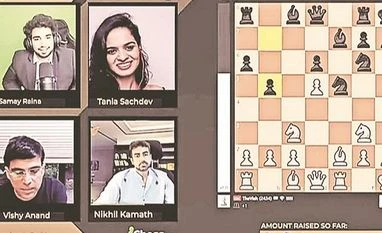On Sunday, premier online chess site, Chess.com hosted a charity event featuring former world champion Viswanathan Anand. Anand (TheVish is his Chess.Com handle) played a simultaneous exhibition against nine celebrities in two batches. This was in conjunction with the Akshaya Patra NGO and the All India Chess Federation (AICF) to raise money to pay for the food and education of children, and for Covid relief.
The Chennai superstar took on five players — Nikhil Kamath, Yuzvendra Chahal, Sudeepa Khicha, Sajid Nadiadwala and Riteish Deshmukh — in one simul and Aamir Khan, Arijit Singh, Ananya Birla and Manu Kumar Jain in the other.
The terms were simple. The Grandmaster took the white pieces in every game (the master always takes the same colour in a simul otherwise it is possible for opponents to mirror his moves). Both players had 30 minutes on their clocks.
The games were broadcast live with an audience that topped out at 30,000-plus. The 51-year-old Anand, who is still India no 1 and World no 15, won eight games with ease. Chahal, who played good chess as a junior before he turned his talents to leg spin, was expected to put up a tough fight.
But the ninth game — the one Anand did not win — was a shocker. Zerodha founder-billionaire Nikhil Kamath “played” a cracker. He sacrificed a pawn on the first move in a rare line called the Ross Gambit, and followed up with a series of tactical hammer-blows. On Move 34, Anand resigned sportingly in a dead-lost position.
Kamath had 13 seconds left and would have lost by just running out of time if Anand had continued playing. But the champion did not see the point of gamesmanship and generously said, “It’s a bit silly, in fact ridiculous, for me to blitz at that point. After some point I could not detect a single mistake in his moves. They were just all perfect, tactically also perfect, everything worked.”
The real kicker came soon after. Chess.com permanently closed Nikhil Kamath’s account for “Fair Play violation” — in plain language, cheating. It also closed the accounts of Khicha and Nadiadwala (both of whom lost) for the same offence.
In a sort of public apology, Kamath tweeted a confessional statement, “I had help from the people analysing the games, computers and the graciousness of Anand sir himself.”
Anand, classy as ever, responded, “Yesterday was a celebrity simul for people to raise money. It was a fun experience upholding the ethics of the game. I just played the position on the board and expected the same from everyone else.” That is about as polite a snub as you can expect.
It is hard to see Kamath living this down easily or quickly, and it doesn’t do Zerodha’s brand much good either. There must be thousands of Zerodha account-holders wincing at the thought of this utterly unnecessary scandal.
What possessed Kamath, or Khicha, or Nadiadwala, to cheat in an event where there was literally nothing at stake for them except their reputations, which they’ve dumped in the drain? Presumably the answers lie in the realm of behavioural science.
The other thing that is astonishing is the apparent lack of awareness about the anti-cheating measures every online chess site deploys. Chess.com routinely detects and bans hundreds of accounts every day for cheating.
The technology of cheating and cheat-detection are both easy to describe. There are multiple free chess engines strong enough to beat human Grandmasters. A human playing against a chess engine is the equivalent of Usain Bolt trying to outrun a car. This makes the fact that Anand actually won against two other cheats quite amazing.
Free software, such as DroidFish, loaded on even low-end smartphones can beat world champions, particularly in short time controls. Online sites work hard to ensure such “help” is not being used. They use many levels of cheat-detection and prevention.
One way is careful statistical analysis of games to check for high coincidence with the moves that engines consider the best in any given position. This includes analysis of time taken as well — a delay in playing even obvious moves is suspicious — it suggests the cheat is spending time looking up the engine response. In important online events, the “hybrid” model is used, with physical observers posted in close proximity to competitors.’
Evading chess cheat detection software is possible but not easy unless you’re a very strong player who’s also pretty smart with programming (there are quite a few such people). In that case, you could mix and match engine help with your own intuition. Of course this begs the question of why you’d want to do this in a charity event. Kamath & Co. might struggle to find a coherent answer to that one for the rest of their lives.
Unlock 30+ premium stories daily hand-picked by our editors, across devices on browser and app.
Pick your 5 favourite companies, get a daily email with all news updates on them.
Full access to our intuitive epaper - clip, save, share articles from any device; newspaper archives from 2006.
Preferential invites to Business Standard events.
Curated newsletters on markets, personal finance, policy & politics, start-ups, technology, and more.
)